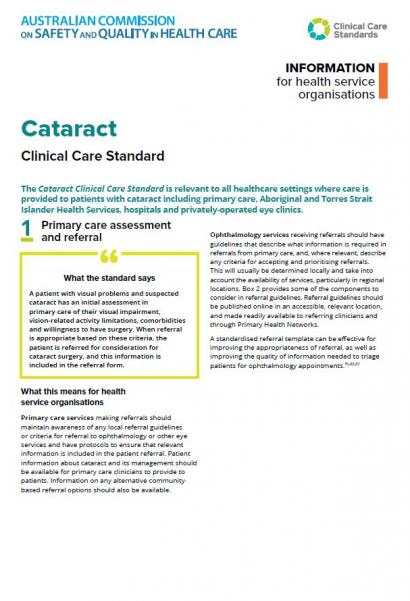Accreditation provides assurances to the community that healthcare services meet the expected standards for safety and quality. It is a formal program where trained independent reviewers assess evidence of implementation for specified standards.
The Commission has developed a range of resources to support hospitals measure safety culture.
An overview of the identification, selection, modification and testing of the survey.
The Commission delivered consultations to develop the requirements for the National One Stop Shop and the National Clinical Trials Front Door, on behalf of the Australian Government Department of Health and Aged Care, in partnership with all jurisdictions via the Clinical Trials Project Reference Group.
A range of media and communications assets are available to help promote the Fourth Australian Atlas of Healthcare Variation 2021.
World Hand Hygiene Day is held annually on 5 May. The 'Save Lives: Clean Your Hands' global campaign was launched by the World Health Organization (WHO) in 2009.
New resources are now available for World Hand Hygiene Day 2025.
The Commission undertakes projects and programs to support the safe and quality use of medicines. This includes national guiding principles and national indicators for QUM in Australian hospitals.
From 1 January 2023, the Commission became the custodian of a range of QUM functions, expanding our role in QUM stewardship. For more information about these QUM functions please visit the QUM Transition page.
Summaries of the key data findings for each state and territory, as well as a national data summary from the fourth Atlas 2021 are available for download:
The Australian Atlas of Healthcare Variation series explores the extent to which use of health care in Australia varies depending on where people live, how their care is funded and their level of socioeconomic disadvantage.
The Commission consulted widely in the development of this Atlas including with a number of clinical colleges and societies, the Australian Government Department of Health, state and territory health departments and healthcare organisations. The Commission also wishes to acknowledge the significant contribution of its advisory groups and other experts.
The Commission made the following overarching recommendations in light of the findings of the Fourth Australian Atlas of Healthcare Variation. These broad recommendations relate to more than one of the topics covered in the fourth Atlas.
The Sepsis Clinical Care Standard ensures that a patient presenting with signs and symptoms of sepsis receives optimal care, from symptom onset through to discharge from hospital and survivorship care.
The national standard was released by the Commission on 30 June 2022.
Proton pump inhibitor (PPI) medicines are one of the most commonly used medicines in Australia, particularly among older people. Find out about variations in PPI prescription dispensing in the Fourth Australian Atlas of Healthcare Variation 2021.
Medication management reviews (MMRs) assess a person’s medicines to reduce the risk of harm. Find out about variation in MMR rates in the Fourth Australian Atlas of Healthcare Variation 2021.
Polypharmacy is when people are using five or more medicines at the same time. This can increase their risk of medicines-related harm. Find out about variation in rates of polypharmacy in the Fourth Australian Atlas of Healthcare Variation 2021.
Gastroscopy is used to investigate, treat and monitor some gastrointestinal conditions. Find out about variation in repeat gastroscopy services in the Fourth Australian Atlas of Healthcare Variation 2021.
Colonoscopy is used to investigate the bowel. Repeat colonoscopy is mainly used to check for polyps and bowel cancer. Find out about variation in repeat colonoscopy rates in the Fourth Australian Atlas of Healthcare Variation 2021.
Gastroscopy is used to investigate, treat or monitor some gastrointestinal conditions. Find out about variation in gastroscopy services in the Fourth Australian Atlas of Healthcare Variation 2021.
Early planned births are when babies are born before 39 weeks of pregnancy by planned caesarean section or induced labour. Find out about early planned births in the Fourth Australian Atlas of Healthcare Variation 2021.

